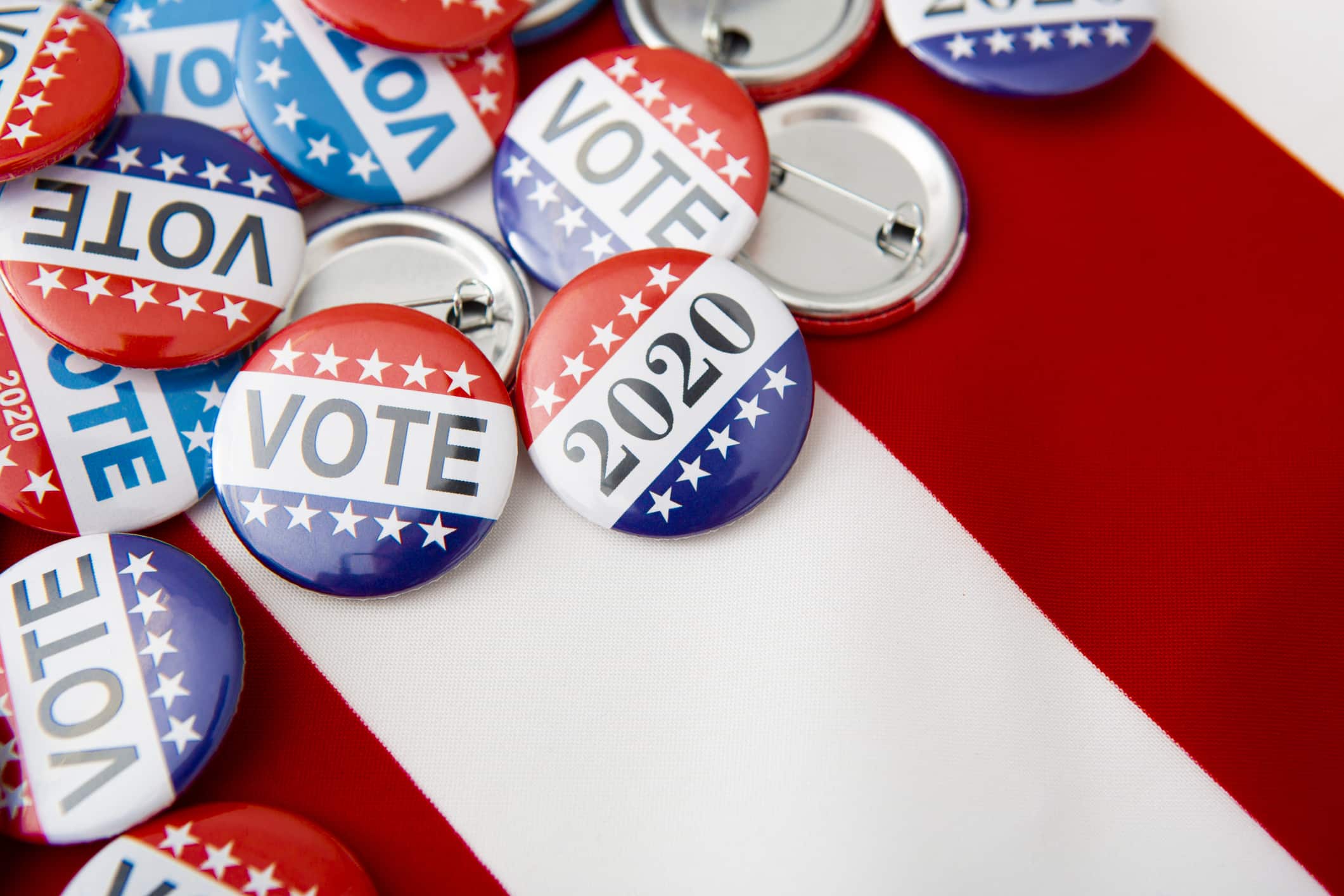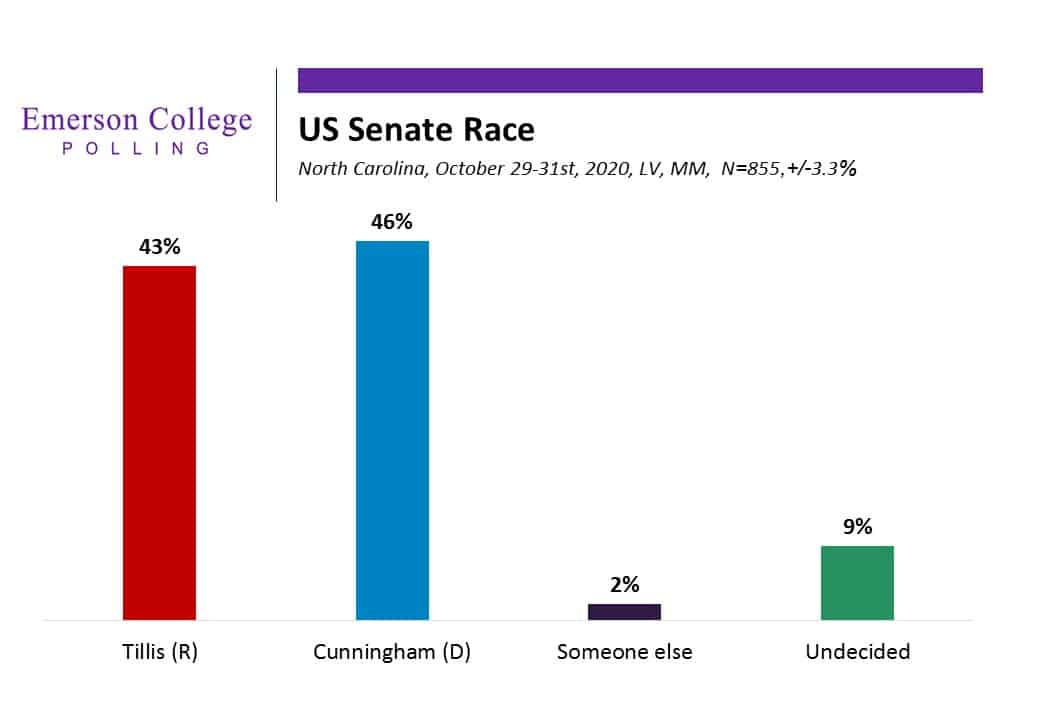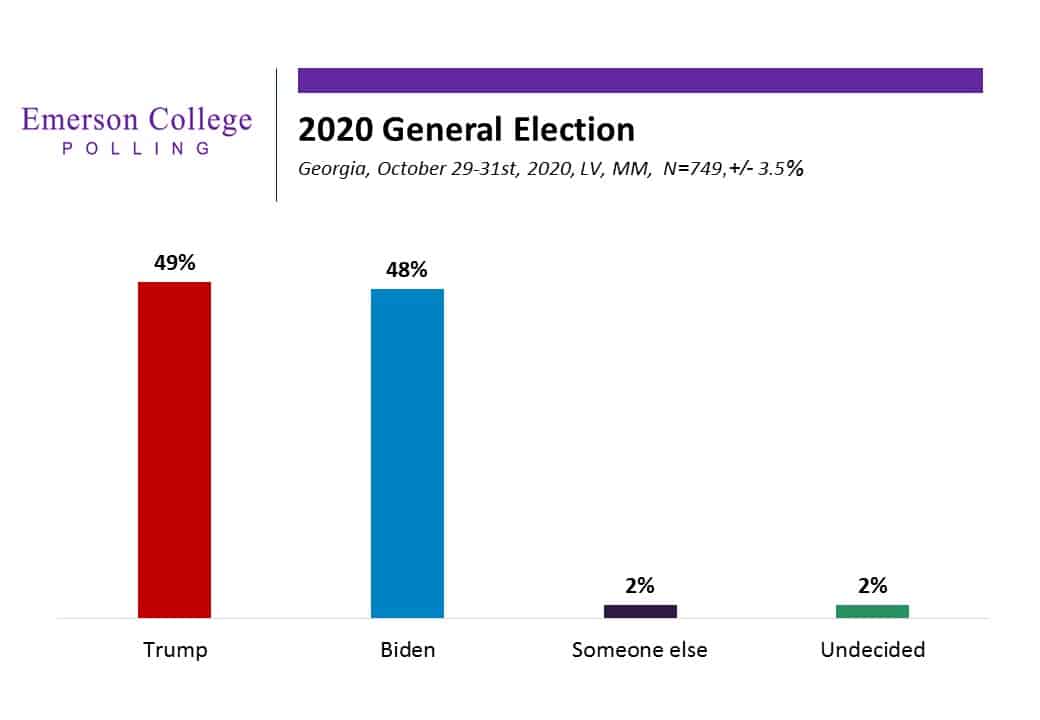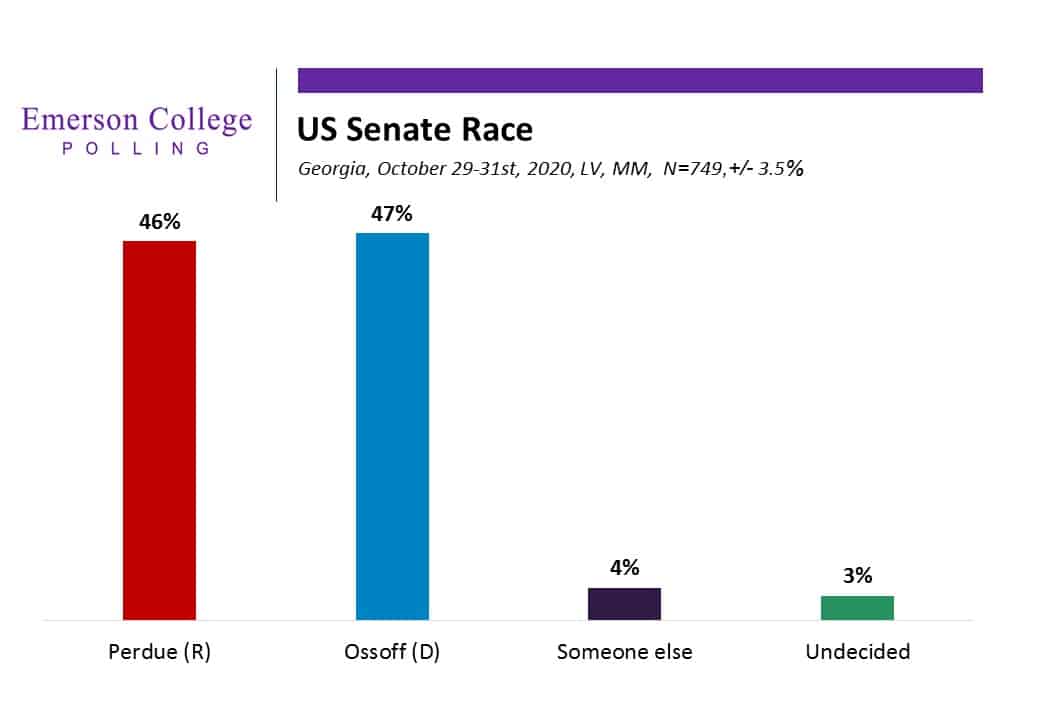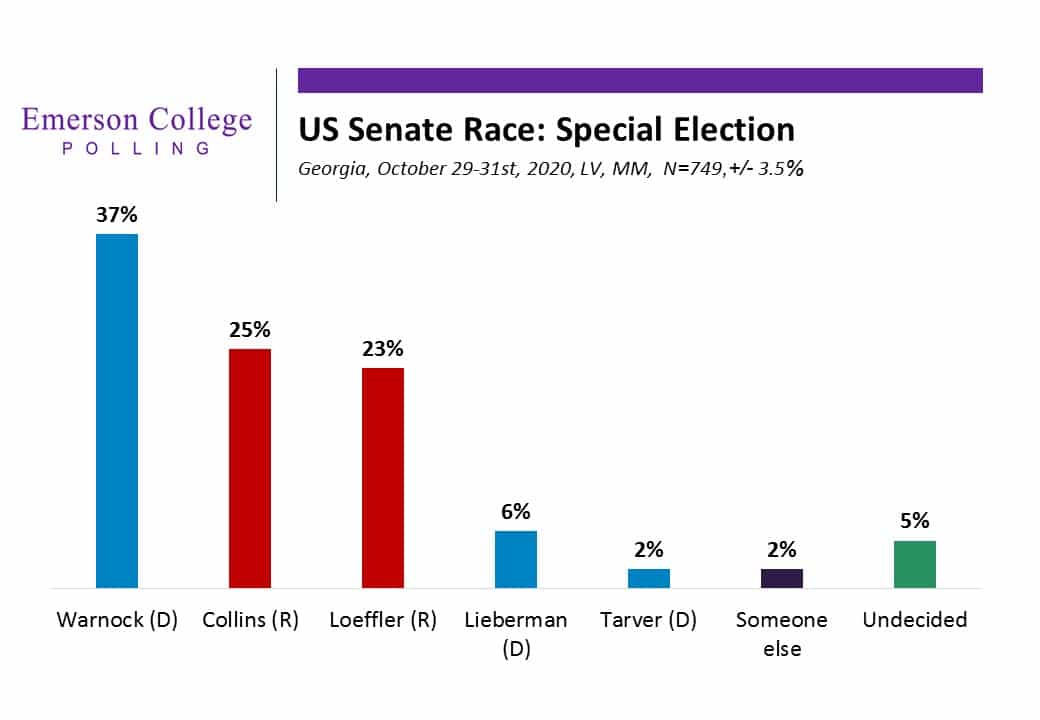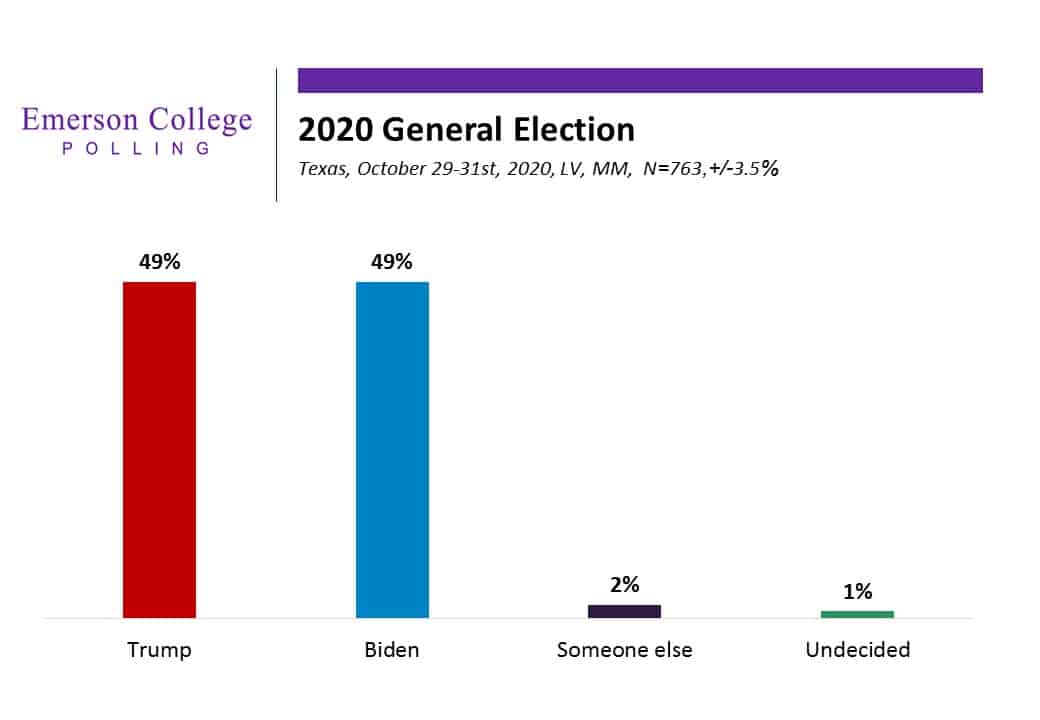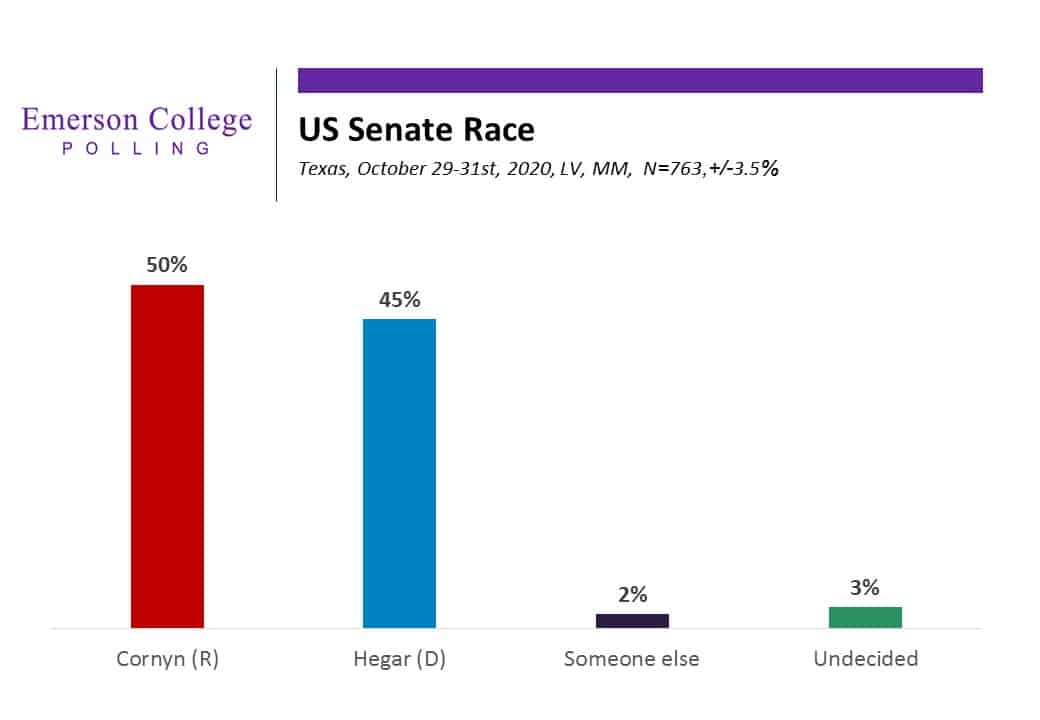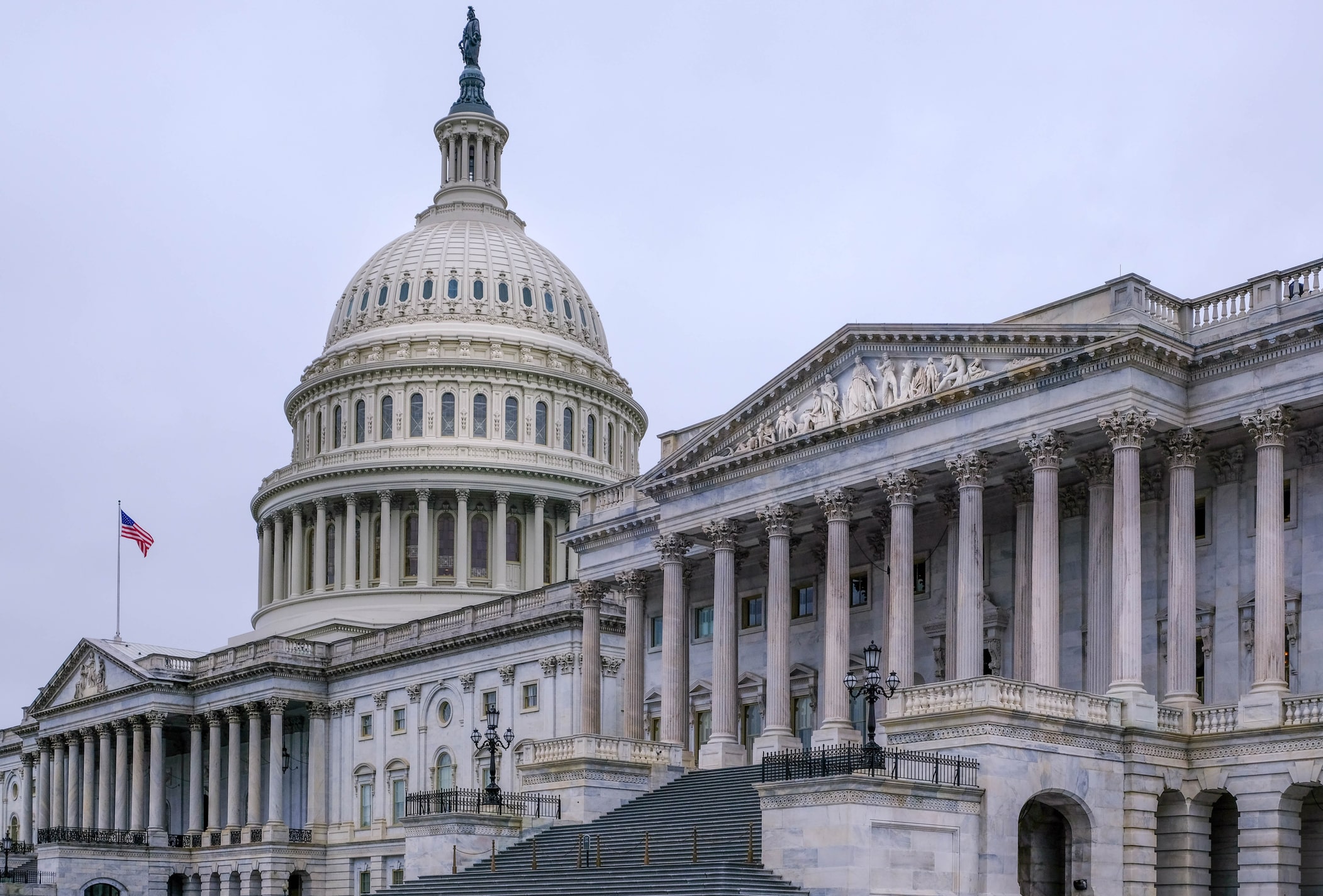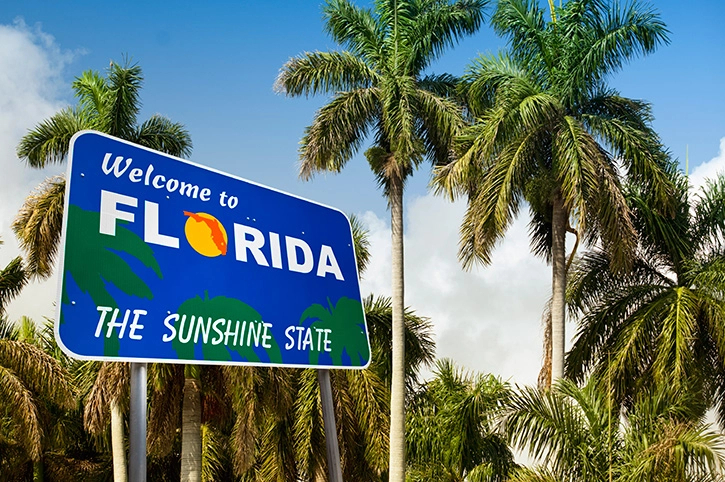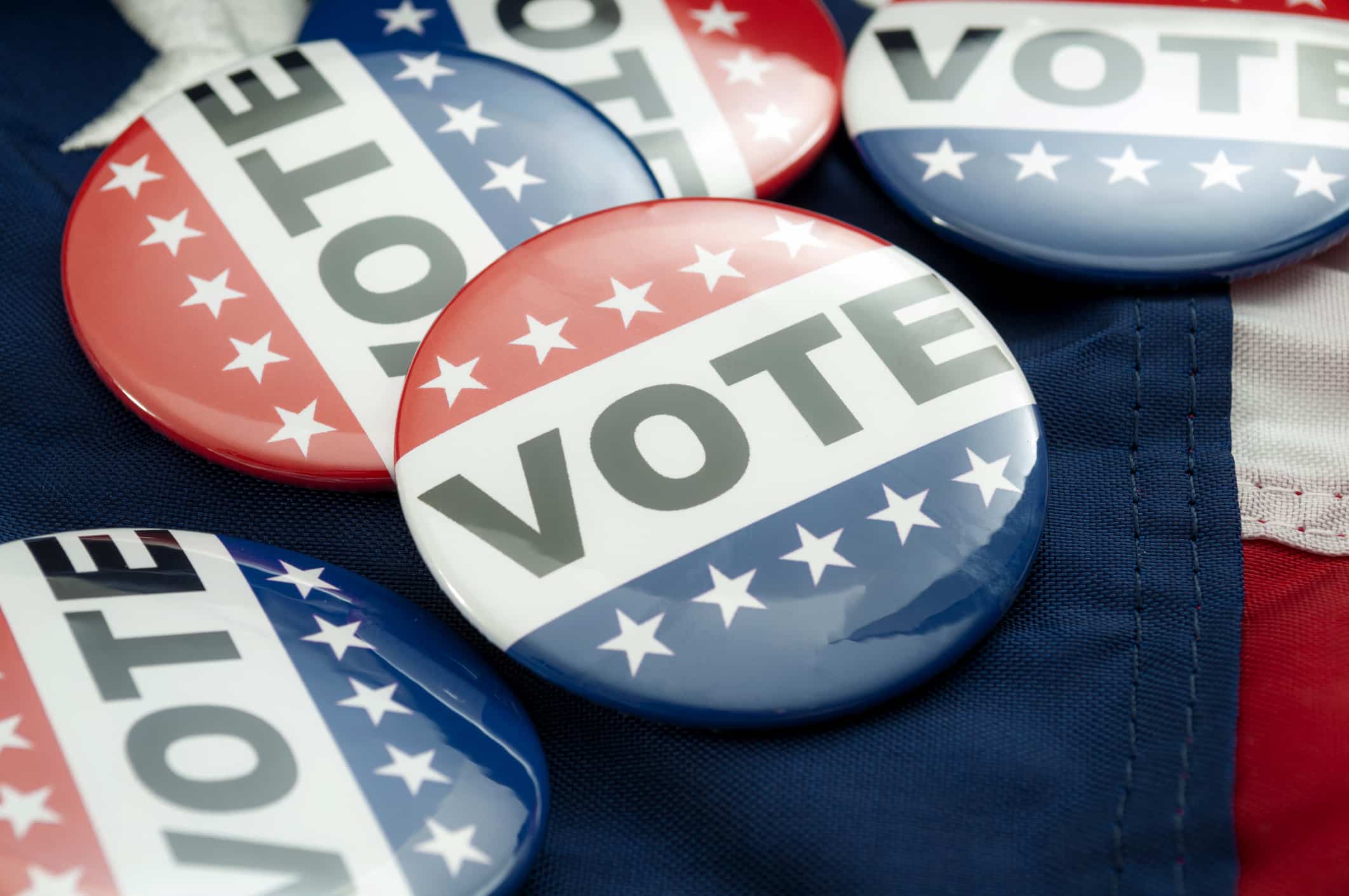The final Emerson College poll before the November 3rd election finds North Carolina in a dead-heat, with former Vice President Joe Biden and President Donald Trump both at 47%. Six-percent (6%) of voters plan to vote for someone else and 1% are undecided.
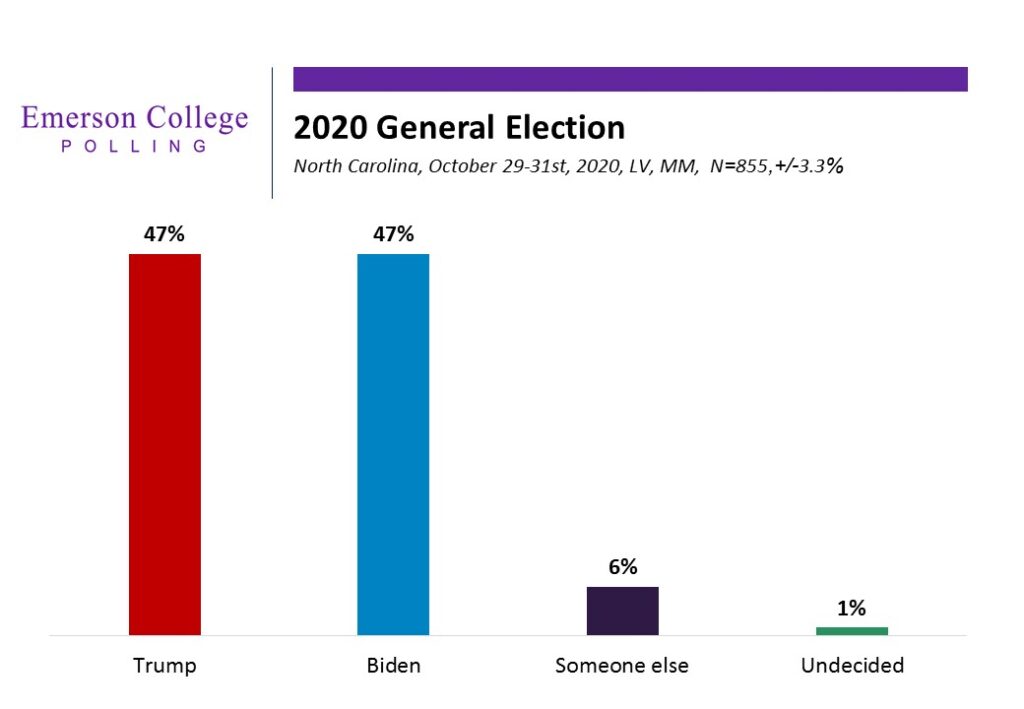
Biden has a lead among suburban voters, 53% to 39%, and urban voters 65% to 33%. Trump has a lead among rural voters 62% to 30%.
Democratic challenger Cal Cunningham leads incumbent Senator Thom Tillis 46% to 43%. Nine-percent 9% are still undecided.
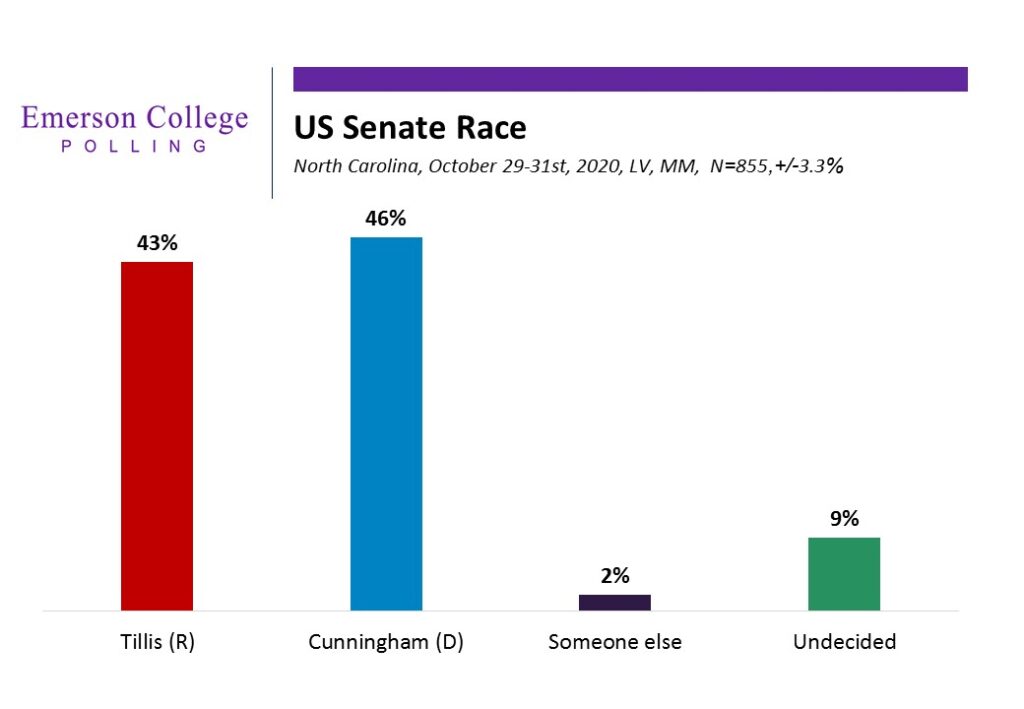
North Carolina voters are also split on Trump’s overall approval, with 48% disapproving of the job Trump is doing as president while 47% approve of the job he is doing.
Voters were asked how much of a public health threat they think coronavirus is and the majority (52%) think it is a major threat while 26% say it is a moderate threat, 17% think it is a minor threat and 5% think it is no threat at all. The majority (83%) of those voting for Biden think it is a major threat while a plurality (40%) of those voting for Trump thinks it is a moderate threat.
A plurality (37%) of North Carolina voters say the economy is the most important issue in deciding their vote for president, followed by social justice with 18%, COVID-19 response with 17%, health care with 9%, climate change with 4% and the supreme court with 3%.
Among Trump voters, the majority (68%) say the economy is the most important issue.
Biden voters are split between COVID-19 response (31%), social justice (29%), health care (16%), and climate change (7%).
Caller ID
The North Carolina Emerson College poll was conducted October 29-31, 2020. The sample consisted of likely Democratic, Republican, and Independent voters, n=855, with a Credibility Interval (CI) similar to a poll’s margin of error (MOE) of +/-3.3 percentage points. The data sets were weighted by gender, age, education, party affiliation, race and region based on 2016 voter turnout modeling. It is important to remember that subsets based on gender, age, party breakdown, ethnicity, and region carry with them higher margins of error, as the sample size is reduced. Data was collected using an Interactive Voice Response (IVR) system of landlines (n=437), SMS-to-web texts (n=283), and an online panel provided by MTurk (n=136).
Florida 2020
The final Emerson College poll before the November 3rd election in Florida finds the former Vice President Joe Biden leading President Donald Trump 51% to 45%. Two-percent (2%) of voters plan to vote for someone else and 2% are undecided. Since the last Emerson College poll in Florida earlier this month, Biden’s lead has expanded by three points in the state.
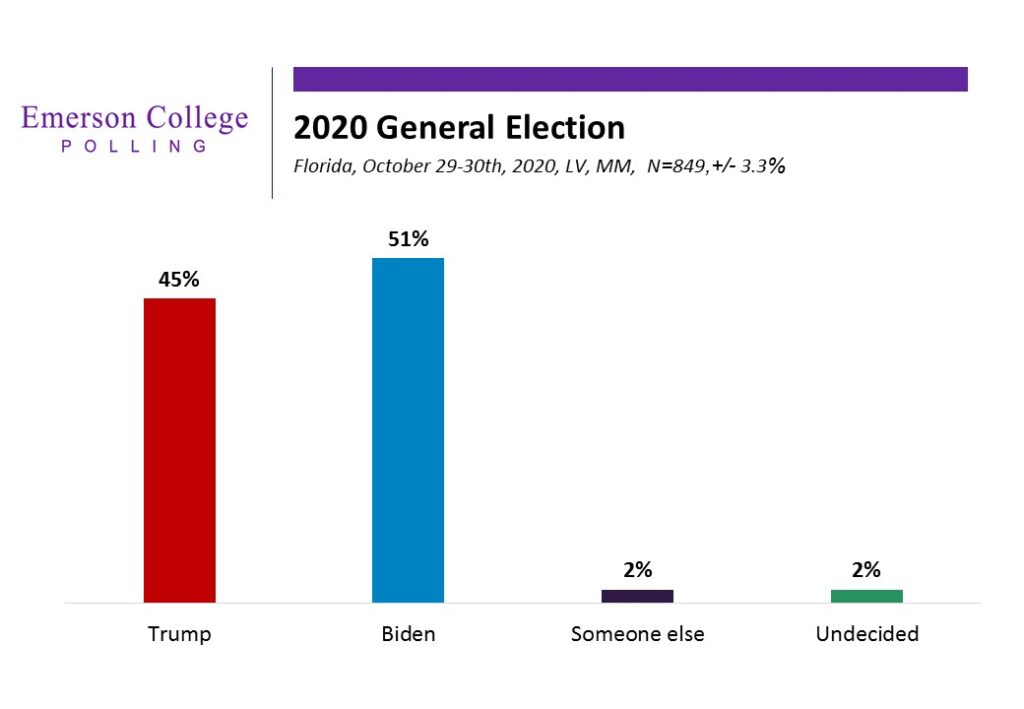
Biden has a lead among suburban voters, 55% to 40%, and urban voters 51% to 47%. Trump has a lead among rural voters 64% to 32%.
The majority (51%) of Florida voters disapprove of the job Donald Trump is doing as president while 45% approve of the job he is doing.
Voters were asked how much of a public health threat they think coronavirus is and the majority (53%) think it is a major threat while 26% say it is a moderate threat, 14% think it is a minor threat and 7% think it is no threat at all. The majority (82%) of those voting for Biden think it is a major threat while a plurality (42%) of those voting for Trump thinks it is a moderate threat.
A plurality (36%) of Florida voters say the economy is the most important issue in deciding their vote for president, followed by COVID-19 response with 24%, social justice with 11%, health care with 10%, climate change with 5%, and the supreme court with 3%.
Among Trump voters, the majority (67%) say the economy is the most important issue.
Biden voters are split between COVID-19 response (41%), social justice (18%), health care (13%), and climate change (9%).
Caller ID
The Florida Emerson College poll was conducted October 29-30, 2020. The sample consisted of likely Democratic, Republican, and Independent voters, n=849, with a Credibility Interval (CI) similar to a poll’s margin of error (MOE) of +/-3.3% percentage points. The data sets were weighted by gender, age, education, party affiliation, race and region based on 2016 voter turnout modeling. It is important to remember that subsets based on gender, age, party breakdown, ethnicity, and region carry with them higher margins of error, as the sample size is reduced. Data was collected using an Interactive Voice Response (IVR) system of landlines (n=551), SMS-to-web texts (n=129), and an online panel provided by MTurk (n=169).
Georgia 2020
The final Emerson College poll before the November 3rd election in Georgia finds President Trump leading Biden by less than a point, 49% to 48%. Two percent (2%) of voters plan to vote for someone else and 2% are undecided.
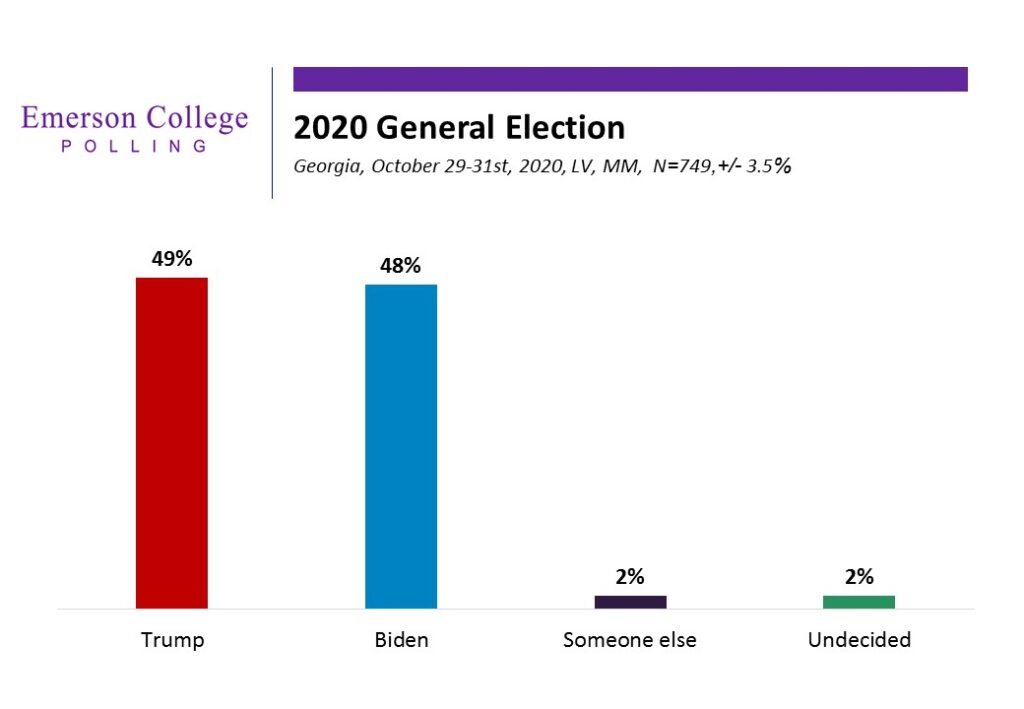
Biden leads Trump among independent voters in Georgia 52% to 35%. The majority (72%) of those who did not vote in 2016 and the majority (56%) of voters who voted third party in 2016 are supporting Biden this November
In the first US Senate race, Democratic challenger Jon Ossoff leads incumbent Republican Senator David Perdue 47% to 46%.
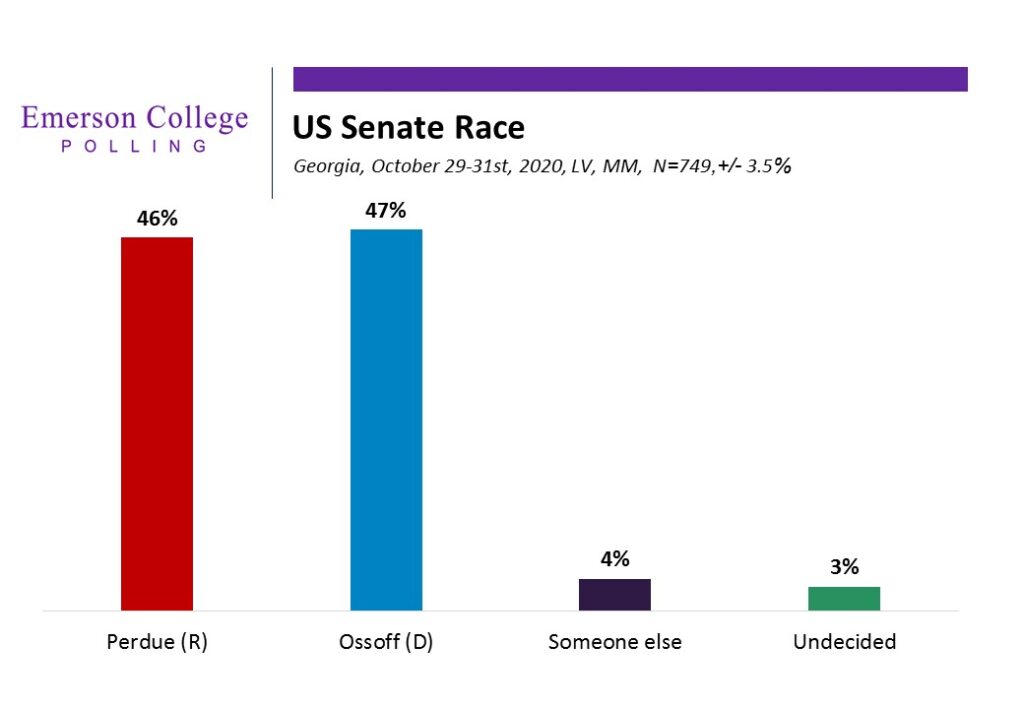
In the special US Senate election in Georgia, no candidate reaches the necessary 50% to win the election before a runoff. The plurality of Georgia voters supports Democrat Ralphael Warnock with 37%, followed by Republican Doug Collins with 25%, incumbent senator Kelly Loeffler with 23%, Democrat Matt Lieberman with 6%, and Democrat Ed Tarver with 2%. Five percent (5%) are undecided and 2% plan to vote for someone else.
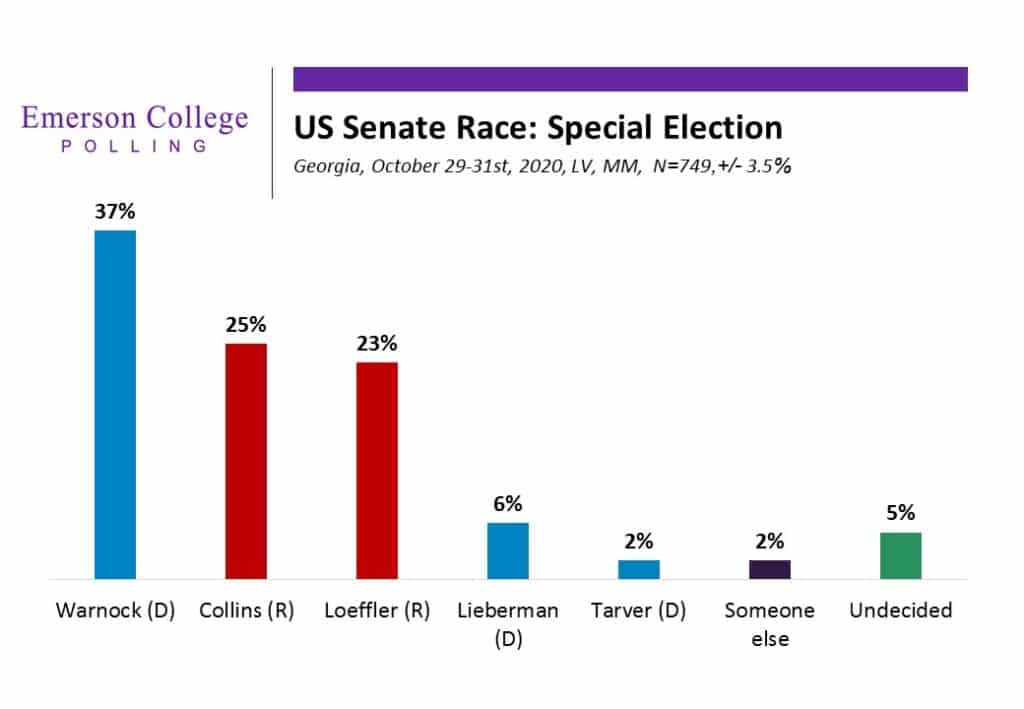
Georgia voters are split on the job Donald Trump is doing as President, 47% of Georgia voters disapprove and 47% approve of the job he is doing as president.
Voters were asked how much of a public health threat they think coronavirus is and the majority (51%) think it is a major threat while 30% say it is a moderate threat, 15% think it is a minor threat and 5% think it is no threat at all. The majority (79%) of those voting for Biden think it is a major threat while the plurality (42%) of those voting for Trump thinks it is a moderate threat.
The plurality (39%) of Georgia voters say the economy is the most important issue in deciding their vote for president, followed by social justice with 17%, COVID-19 response with 14%, healthcare with 13%, climate change with 6%, and the Supreme Court with 3%.
Among Trump voters, the majority (65%) say the economy is the most important issue.
Biden voters are split between COVID-19 response (27%), social justice (27%), and healthcare (19%).
Caller ID
The Georgia Emerson College poll was conducted October 29-31, 2020. The sample consisted of likely Democratic, Republican, and Independent voters, n= 749, with a Credibility Interval (CI) similar to a poll’s margin of error (MOE) of +/- 3.5 percentage points. The data sets were weighted by gender, age, education, party affiliation, race and region based on 2016 voter turnout modeling. It is important to remember that subsets based on gender, age, party breakdown, ethnicity, and region carry with them higher margins of error, as the sample size is reduced. Data was collected using an Interactive Voice Response (IVR) system of landlines (n=380), SMS-to-web texts (n=120), and an online panel provided by MTurk (n=249).
Texas 2020
The final Emerson College poll before the November 3rd election in Texas finds the presidential election in a dead heat, with President Trump and former Vice President Joe Biden 49% to 49%. Two percent (2%) of voters plan to vote for someone else and one percent (1%) are undecided.
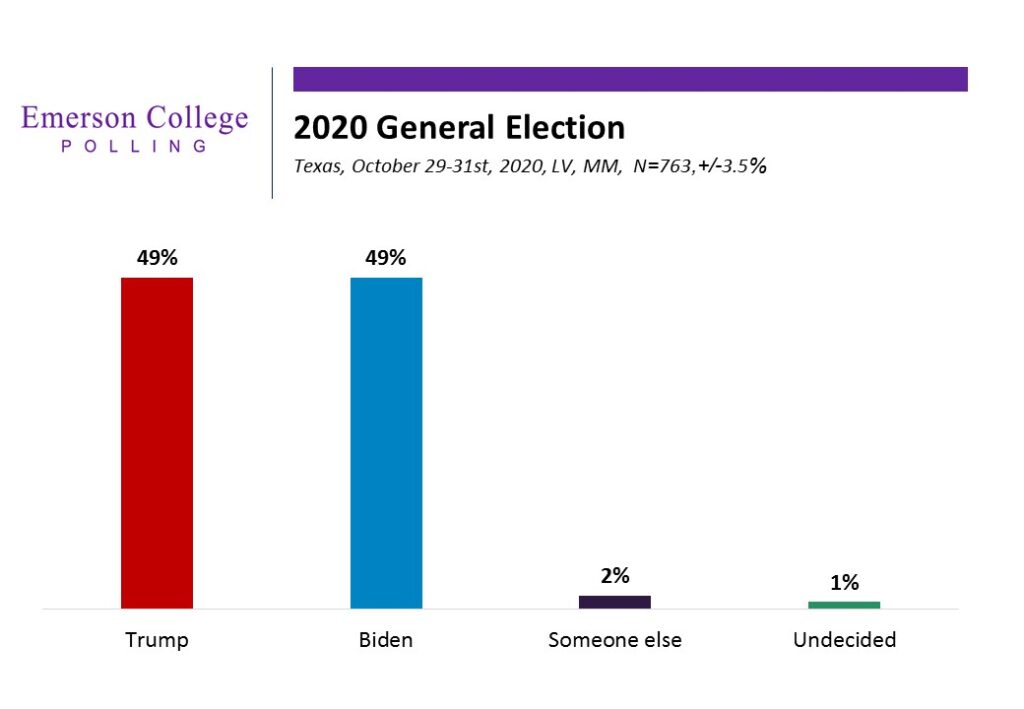
Biden has a lead among suburban voters, 49% to 48%, and urban voters 57% to 41%. Trump has a lead among rural voters 68% to 32%.
In the Senate race, incumbent Republican Senator John Cornyn leads Democratic challenger MJ Hegar 50% to 45%. Two percent (2%) plan to vote for someone else and three percent (3%) are undecided.
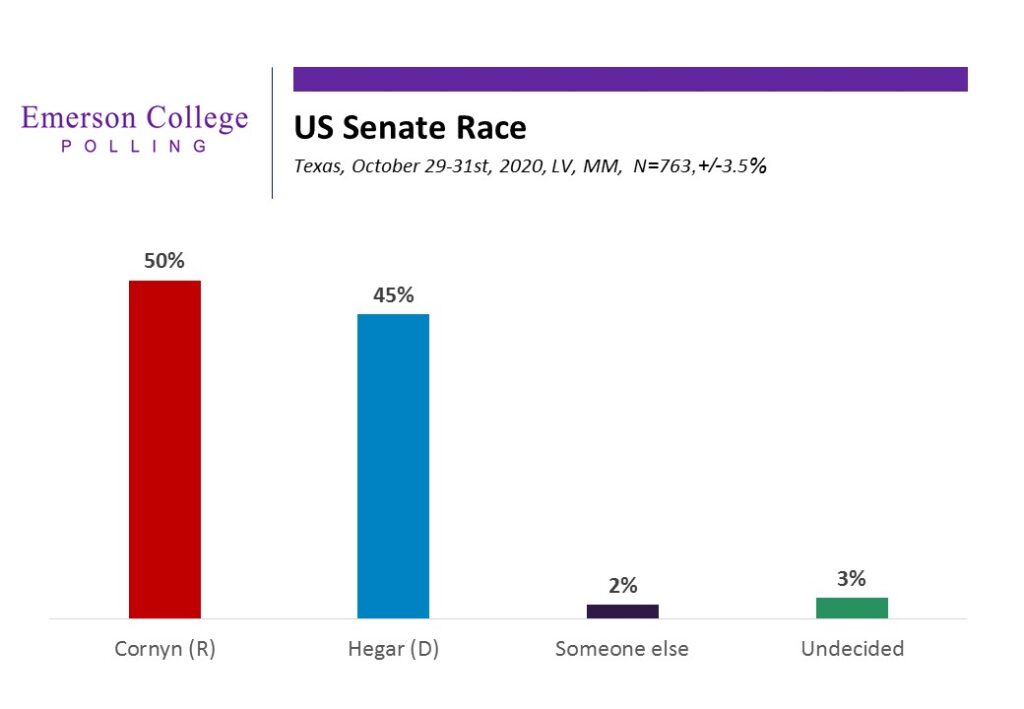
The plurality (49%) of Texas voters approve of the job Donald Trump is doing as president while 46% approve of the job he is doing.
Voters were asked how much of a public health threat they think coronavirus is and the plurality (46%) think it is a major threat while 33% say it is a moderate threat, 15% think it is a minor threat and 6% think it is no threat at all. The majority (78%) of those voting for Biden think it is a major threat while the plurality (49%) of those voting for Trump thinks it is a moderate threat and 27% say it is a mild threat.
The plurality (40%) of Texas voters say the economy is the most important issue in deciding their vote for president, followed COVID-19 response with 18%, by social justice with 13%, healthcare with 10%, climate change with 5% and the supreme court with 4%.
Among Trump voters, the majority (69%) say the economy is the most important issue.
The plurality (33%) of Biden voters say COVID-19 response is the most important issue, followed by healthcare with 25%, and social justice with 21%, and climate change with 9%.
Caller ID
The Texas Emerson College poll was conducted October 29-31, 2020. The sample consisted of likely Democratic, Republican, and Independent voters, n=763, with a Credibility Interval (CI) similar to a poll’s margin of error (MOE) of +/- 3.5 percentage points. The data sets were weighted by gender, age, education, party affiliation, race and region based on 2016 voter turnout modeling. It is important to remember that subsets based on gender, age, party breakdown, ethnicity, and region carry with them higher margins of error, as the sample size is reduced. Data was collected using an Interactive Voice Response (IVR) system of landlines (n=366), SMS-to-web texts (n=193), and an online panel provided by MTurk (n=204).



